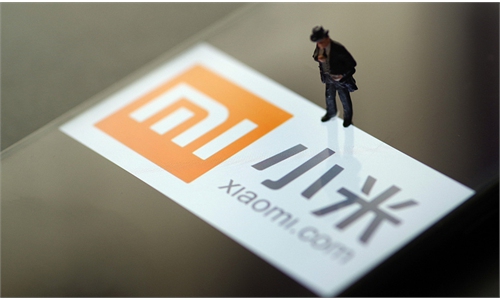Xiaomi reiterates Indian operations compliant with local laws, after its challenge to $676 million asset freeze reportedly rejected by court

Customers are seen at a store of Chinese technology company Xiaomi in Chennai, India, Oct 8, 2019. Photo: Xinhua
Chinese smartphone maker Xiaomi said it wants to reiterate that its operations in India are compliant with all local laws and regulations, after an Indian court has reportedly rejected its petition against the seizure of 55.51 billion rupees ($676 million), which was frozen last year by the federal financial crime agency for alleged illegal remittances to foreign entities by passing them off as royalty payments.
Amid the Indian government's pursuit to translate the dividends from its swelling population - which is estimated to take over China as the world's most populous country by mid-2023 - to growth potential, New Delhi's unreasonable crackdown against Chinese companies could take a bite on its own market reputation and further weigh on the development of the local manufacturing industry, which is deemed vital to providing employment for its massive workforce, observers warned.
"We are studying the matter and waiting for the written order," Xiaomi India spokesperson told the Global Times on Saturday, in response to the reported rejection.
The continuance of the suppression against Chinese tech companies comes after Apple CEO Tim Cook on Tuesday inaugurated his company's first retail store in India's city of Mumbai.
It also adds to a flurry of India's blockade against Chinese companies over the past two years, such as launching a broad investigation targeting Chinese companies operating in the country on tax and income issues, banning more than 300 Chinese apps including TikTok and tightening rules for Chinese companies investing in India.
According to a Reuters report, in the Indian smartphone market, Xiaomi has lost its top spot to rival Samsung.
Industry observers warned that as India, based on UN's State of World Population Report for 2023, is set to overtake China as the world's most populous nation, the country now is at an important juncture to steer the economy forward, otherwise its huge population could create headaches such as high unemployment.
While manufacturing sector could become a potential major source of job opportunities for India, India's clear targeting at Chinese tech firms could dampen global investor's confidence in investing in the country, which could in turn take a toll on the growth of an already staggering manufacturing sector, industry insiders said.
And if the investors' growing concerns on business environment are not addressed appropriately, the so-called "dividends from population" will vanish, and instead it would create a huge burden for the economy, analysts said, urging India to create a sound and fair business environment for Chinese smartphone companies.
In March, India's unemployment rose to a three-month high to 7.8 percent as the country's labor market deteriorated, according to latest data from India's Centre for Monitoring Indian Economy.



